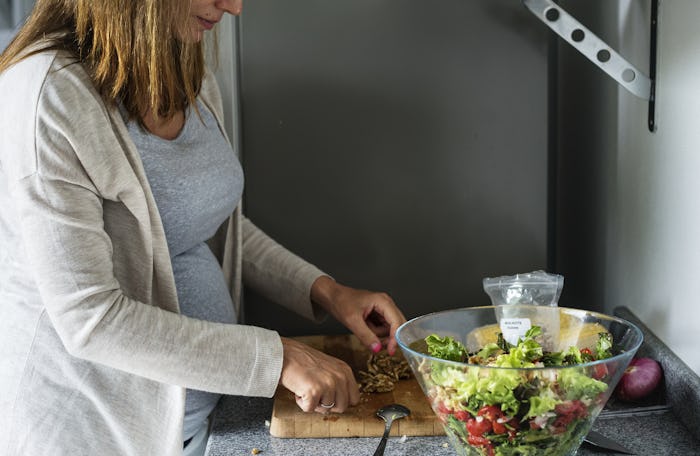Life

Don't Skip The Cravings, But Here Are 10 Foods You Should Try To Eat During Pregnancy
While pop culture often depicts pregnancy as a time to indulge in cravings for sweets and high-fat food, proper nutrition is vital to the well-being of mother and baby. After all, as a nutritionist friend of mine once said, nature's priority is to nourish the new life. Whatever vitamins or minerals are lacking in your diet will be depleted from your own reserves and passed to your fetus. That's not to say you have to skip the ice cream (after all, it has calcium), but there are some foods to eat during pregnancy whether you're an omnivore, vegetarian, or vegan.
Over email, three OB-GYNs share with Romper the recommendations they give their patients for healthy eating and weight gain during pregnancy. Elizabeth West of Miller Children’s & Women’s Hospital in Long Beach, California says, "In pregnancy it’s important for a patient to try to get as much nutrient-rich food as possible. Focusing on whole grains, lean protein, and fresh fruits and vegetables is very important. Eating foods that are minimally processed and avoiding packaged foods is best since they contain a huge amount of salt, which can worsen blood pressure and pregnancy-related swelling. It’s also important to take a daily prenatal vitamin."
A healthy diet during pregnancy should lead to a weight gain of about one to two pounds per month, says Mary O'Toole of Saddleback Medical Center in Laguna Hills, California. Your doctor may recommend a little more or a little less total weight gain for you depending on your pre-pregnancy condition. O'Toole recommends a combination of grains, milk, cheese, fruit, and vegetables. She does note, however, that "women should avoid fish high in mercury like shark, swordfish, tuna, and mackerel. I advise against raw fish like sushi... deli meats may be consumed but I advise heating to kill any bacteria. No unpasteurized cheeses, limit caffeine, and no alcoholic drinks." And regardless of your dietary preferences, O'Toole urges her patients to get plenty of protein in their diet.
Since pregnancy can make you a little spacier than usual, try MemorialCare Orange Coast Medical Center's Yen Tran's acronym for remembering what foods to eat: ABCDEFG (avocado, broccoli and berries, choline, DHA and vitamin D from an Omega 3 fatty acid supplement, eggs, and grains). Here's more on these healthy foods and others, including special concerns for vegetarians and vegans.
1Avocado
These rich and creamy fruits contain monosaturated fatty acids and potassium. Together these nutrients help with fetal skin and brain development, as well as relief of pregnancy-related leg cramps, says Tran. As a bonus, who doesn't love guacomole?
2Broccoli
Steam or stir-fry this green vegetable, or eat it raw with hummus or the dip of your choice. Broccoli contains fiber, which helps with pregnancy-related constipation, and vitamin C, Tran notes.
3Berries
Eat them naked, blend them in smoothies, or top them with a dollop of plain yogurt, vanilla ice cream, or whipped cream. According to Tran, you should make berries your go-to fruit for antioxidants and Vitamin C.
4Whole Grains
Whole grains provide a big nutrient bang for your buck: protein, fiber, B vitamins, and antioxidants. They generally keep you fulling full longer and don't have the side effect of blood sugar crashes that simple carbs provoke in some people, Tran notes. Think brown rice, whole wheat bread, whole oats, bulgar, and quinoa.
5Eggs
This versatile food (think breakfast, boiled as a snack, or breakfast-for-dinner) provides protein for vegetarians and omnivores alike. They also contain the brain-boosting nutrient choline, part of Tran's acronym.
6Lean Meats
Skinless chicken and turkey, or red meat with the fat trimmed off, are good sources of iron and protein. Iron helps deliver oxygen to human tissue, says Tran, which makes it important for your growing baby. However, make sure to eat some orange slices or bell peppers with your meal, as vitamin C helps your body absorb iron.
7Beans & Lentils
These are a great source of protein for vegetarians and vegans, but all pregnant women can benefit from incorporating beans and lentils into their diet. They contain folate (an important B vitamin for your baby) and are high in fiber to help with constipation and keep you feeling satiated between meals.
8Dairy
Incorporating milk, yogurt, and cheese into your diet provides calcium. Vegans can get calcium from other sources, such as leafy greens (which also supply iron) and supplements.
9Nuts
Whether you eat them raw or in butter form, nuts provide protein and healthy unsaturated fats.
10Soy Foods
Vegetarians and vegans can find protein in tofu and other soy-based foods. Overall, West says that vegetarian and vegan moms-to-be should "focus on lean protein sources such as rice and beans, tofu, nut and soy milk, and raw nuts." As for supplements, she adds that "there are several brands of vegan prenatal vitamins that don’t contain gelatin byproducts." To get a brain-healthy dose of omega-3 fatty acids, look for vegan DHA supplements made from flaxseeds and other non-animal sources. Also, talk to your doctor about dietary restrictions at the beginning of your pregnancy so they can check your levels of vitamin B12, iron, and folate.
Check out Romper's new video series, Bearing The Motherload, where disagreeing parents from different sides of an issue sit down with a mediator and talk about how to support (and not judge) each other’s parenting perspectives. New episodes air Mondays on Facebook.